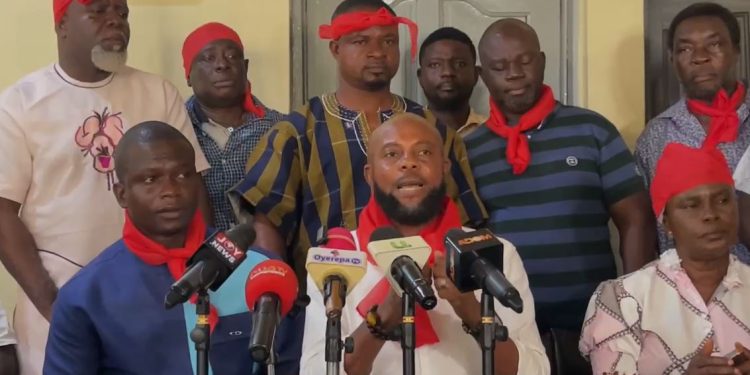ACCRA, Ghana – Major transport unions in Accra have announced plans to launch a crippling strike starting Tuesday, September 16, 2025, in a bid to halt what they call the illegal takeover of lands meant for lorry stations by private developers. The action threatens to grind the city’s bustling transport system to a halt, affecting commuters, businesses, and daily life in the capital.
The unions leading the protest include the Ghana Private Road Transport Union (GPRTU), the Concerned Drivers Association of Ghana, the Commercial Transport Operators, and the Container Owners Association. These groups, representing thousands of drivers, operators, and station workers, claim that private entities are encroaching on designated public lands, squeezing out essential transport hubs and pushing up operational costs.
In a joint statement released on Monday, September 15, 2025, the unions expressed their frustration with what they described as “unlawful land grabs” that have left drivers without proper parking and loading facilities. “These lorry stations are the lifeblood of our operations. Without them, we can’t work efficiently, and passengers suffer too,” said a spokesperson for the GPRTU, who spoke on condition of anonymity due to ongoing negotiations. The unions argue that the encroachments violate zoning laws and deprive them of affordable spaces, forcing some to park on roadsides and risk fines or accidents.
Background to the Dispute
Accra’s transport woes are nothing new, but this latest standoff highlights deeper issues around urban land management and development pressures. The city has seen rapid growth, with population swelling past 5 million, leading to a scramble for space. Lorry stations, often located in prime areas, have become targets for real estate developers eyeing commercial opportunities like shopping malls or housing projects.
The GPRTU, Ghana’s largest transport union with over 100,000 members, has been vocal about similar grievances for years. In recent months, reports have surfaced of demolitions or fencing off at key stations like Tudu, Circle, and Kaneshie, where private firms allegedly secured dubious permits. Union leaders point to lax enforcement by the Lands Commission and Accra Metropolitan Assembly (AMA), accusing officials of favoring investors over public needs.
This isn’t the first time transport workers have flexed their muscle. Back in 2023, GPRTU threatened strikes over fuel levies and fare regulations, eventually leading to government concessions. Now, with fuel prices set to rise sharply on the same day as the planned strike—petrol up nearly 4% and diesel over 9%, according to the Chamber of Petroleum Consumers (COPEC)—the timing couldn’t be worse. Unions have hinted that the dual pressures could amplify their demands, potentially including calls for fare adjustments.
Projected Impact of the Strike
If the strike goes ahead, expect chaos on Accra’s roads. Taxis, trotros (minibuses), and haulage trucks could stay off the streets, leaving residents scrambling for alternatives like walking, private cars, or ride-hailing apps, which might not cope with the surge. Schools, markets, and offices could see disruptions, especially in high-traffic areas like Madina, Adenta, and Tema.
The Concerned Drivers Association emphasized the human cost, noting that many members are low-wage earners supporting families. “We’re not against development, but it shouldn’t come at our expense,” their representative told reporters. The Container Owners Association, dealing with logistics for imports, warned that port delays could ripple through the supply chain, hiking goods prices amid Ghana’s ongoing economic recovery.
Government response has been muted so far. The Ministry of Roads and Highways issued a brief call for dialogue, but unions dismissed it as insufficient without immediate halts to encroachments. AMA officials were unavailable for comment, though sources suggest emergency meetings have been convened to avert the action.
Broader Context in Ghana’s Urban Challenges
This protest unfolds against a backdrop of intensified efforts to tackle urban sprawl under President John Dramani Mahama’s administration. Since returning to power in January 2025, Mahama has prioritized infrastructure, including transport reforms to ease congestion. Yet, critics say land disputes like this undermine those goals, echoing similar clashes in Kumasi and Takoradi.
Environmental groups have weighed in too, arguing that unplanned development exacerbates flooding and pollution in Accra. The unions’ fight aligns with calls for better urban planning, including the long-delayed Greater Accra Resilient and Integrated Development (GARID) project, funded by the World Bank to modernize stations and roads.




